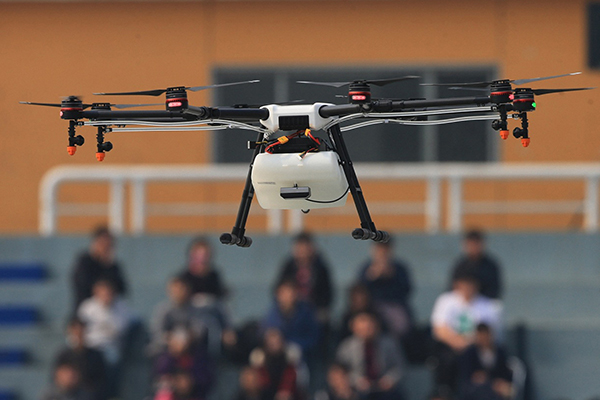Drone maker DJI to launch nationwide farm services
 |
|
DJI launched its first agricultural drone, the MG-1, in November. It can spray pesticide on farmland. [Photo/China Daily] |
The nation's largest commercial drone manufacturer is setting up a vast service network to expand the use of agriculture-specific unmanned aerial vehicles, the company said on Monday.
The Shenzhen-based DJI Innovation Technology Co said it will train 10,000 people across the country to operate the drones and set up 100 after-sales service centers. The company will also offer subsidies to up to 10,000 people to start a business in farm drones.
Cao Nan, the sales director of DJI, said: "The agricultural drone could load 10 kilograms of pesticides and spray an area of up to four hectares per hour. Its work efficiency can reach more than 40 times of a human and it will also solve the shortage of workers in rural areas."
DJI launched its first farm-specific drone, the MG-1, in November.
"Unlike other drones, used in aerial photography, the farm drone needs specialized sales and after-sales service support," said Wang Fan, the company's public relations officer.
He added test flights, assembly and machine maintenance will be provided in the service network.
He Xiongkui, a professor at the Center of Crop Protection Equipment and Spraying Technology at China Agricultural University, said at present the number of agricultural drones is no more than 4,000, but the demand is on the rise.
Moreover, the quality of drones varies greatly and there is no complete after-sale service system, he added.
The penetration rate of agricultural drones in China is only 3 percent, compared with 50 percent in the United States and Japan, so there is a huge potential for growth, industry statistics showed.
With the modernization of agriculture, the demand for advanced farming devices has been growing significantly.
The government has issued policies to promote the use of modern agricultural machinery, which includes offering subsidies to encourage use of drones in agriculture.
She Shuanglin, a researcher at Analysys International, said: "The country's regulation on consumer-specific drones is strict and the risk is relatively high, so it is an inevitable trend more industry-specific drones will appear in the future."
Industry-specific drones include those used in traffic administration and disaster surveillance.



 Print
Print Mail
Mail

